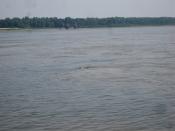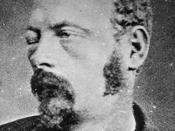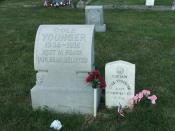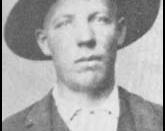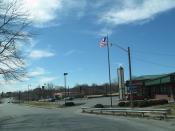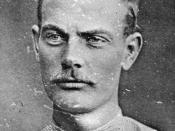Cole Younger is thought to be one of the cruelest men the mid-west has ever seen. He is commonly associated with the likes of Frank and Jesse James, two of Missouri's other notorious outlaws. It is assumed that because Cole lived a life of crime and bloodshed he was a man without morals. I strongly disagree and I think that Cole was forced into a criminal way of life because of the border war tension and his treatment after the Civil War. Otherwise "Cole would have probably gone into politics. He was a fairly good speaker and could, when the occasion was right, extend a glad hand"ÃÂ (George 89). Regardless, hundreds of banks accused Cole Younger of robbing them. It is amazing that if indeed he is guilty of all of them, he was only arrested and convicted for one robbery.
On September 7, 1876 eight men on horseback rode into Northfield, Minnesota.
They came in quietly from three directions so that they would not attract any unwanted attention. Cole Younger took his position in the middle of the street, dismounted, and pretended to adjust the girth of his saddle (Croy 112). Another man, Clell Miller, was to keep watch nearby. Bill Chadwell, Jim Younger, and Frank James were at an adjacent bridge serving as backup. They were waiting for a signal "ÃÂ a pistol shot "ÃÂ to know they were needed. The remaining three men, Bob Younger, Charlie Pitts, and Jesse James, were to rob the Northfield Bank (Younger 78).
In no time at all Joseph Lee Haywood, the cashier, was dead, as was an innocent bystander. The town sprang into arms almost at once. "Rifles peeped out of windows like guns from a fort."ÃÂ The robbers did not plan on such a small town having such a complete arsenal. Clell Miller and Bill Chadwell lay in the middle of the street dead. Jim Younger had been shot in the jaw while Frank James had been shot in the thigh. From a window Bob Younger had been shot in the elbow (Croy 113). The six remaining men rode off on five horses. They had escaped the gunfire, but without a penny. There had been no time to wreck the telegraph office and an alarm was soon sent throughout the country. A thousand dollar reward was offered for each of them, dead or alive.
The robbers set out on the kind of ride they knew so well. Never in all their years had a posse overtaken them, but they had also never left two of their men on the ground. The men were in a strange county. On the prairie their maps were all right, but when they got into the woods and among the lakes they were practically lost. There were nearly 1000 men on the gangs trail. They were watching for them at fords and bridges where it was thought they were likely to go (Younger 82). Bob's shattered elbow was requiring frequent attention and Frank and Jesse felt they were losing valuable time because of Bob's wound. Jim was also injured worse than first anticipated. A bullet had swept away part of his jawbone and he was losing blood quickly (Croy 123). It was decided that the men would split up. The James brothers were to head west while the Youngers, along with Charlie Pitts, were to head east.
The Youngers had decided to abandon their horses a day earlier as a distraction and because the horses were too tired to travel any further. Meanwhile, the pursuers were gaining on the four weary men. On the sixth day after the robbery the men saw a fresh group of seven men ready to charge. The posse men fired and a bullet cut through the staff Cole had been leaning on. The four fired back, but the Youngers were quickly dropped to the ground. Charlie Pitts was the only one standing before he was shot dead (Croy 126). The three brothers were alone and all wounded. With drawn rifles the posse approached. In a moment the three were prisoners. Cole had been wounded eleven times, Jim five, and Bob four. They were taken to prison in Faribault, which had an escape-proof jail (Croy 127). In the meantime, Jesse and Frank James had escaped. They got to Nebraska by train and had gone home to Missouri. The Pinkerton Detectives continued to look for them, but were unsuccessful.
On November 11, 1876 the three Younger brothers pleaded guilty to four charges: the murder of the bank cashier, the murder of the bystander, attempted robbery of the bank in Northfield, and assault on the teller. The brothers realized there was every chance they would be sentenced to hang, but they also knew there was a law in Minnesota that a person who pleads guilty cannot be put to death (Croy 131). Cole spent more than twenty-five years in prison before being paroled. He came out as a man with a tarnished reputation. To understand exactly why Cole Younger became the most wanted outlaw in America we must start from the beginning.
Thomas Coleman Younger was born January 15, 1844 near Lee's Summit, Missouri. He was the seventh of fourteen children at a time when tensions were high along the border of Missouri and Kansas. "The Youngers were a prosperous pioneer family and all seemed well"ÃÂ (Briehan 2). Henry Washington Younger, Cole's father, represented Jackson County three times in the legislature, and was also judge of the county court. He accumulated 3,500 acres of land and owned two slaves. In 1859 he was elected mayor of Harrisonville.
Despite the fact that he had come from Kentucky, Henry Younger was a Union sympathizer. He thought the Union should be preserved and that slavery should be abolished (Croy 6). The Younger family's opposition of the Confederates was effected when a band of Jayhawkers "ÃÂ Kansas men "ÃÂ raided the Younger farm. Henry traveled to Kansas City, the headquarters of the state militia, to see if anything could be done. He started back to Harrisonville in a buggy, but was brutally murdered one mile south of Westport (Croy 8). He fell out of his buggy into the road with three fatal bullet wounds. Captain Walley and his gang were suspected of the murders.
Two months after Henry Younger's death, the same bandits entered the Younger home in the dead of night and tried to force Cole's mother to set fire to her own home at gunpoint. "She begged to be allowed to wait until morning so that she and her children would not be turned out in the snow. The snow was some two or three feet deep and the nearest neighbor was many miles away"ÃÂ (Younger 9). This they agreed to do on the condition that she put the torch to her house at daybreak. They men came back bright and early to see that she carried out her agreement. Leaving burning walls behind her, she and the four youngest children, along with the slave Suse, began their eight-mile trudge through the snow to their other farm in Harrisonville. Cole has always felt that, "the exposure to which she was subjected to on that journey was the direct cause of her death"ÃÂ (9).
There had come into being two groups, each at the other's throats. The men in Missouri were called "bushwhackers"ÃÂ; the ones in Kansas were "Jayhawkers."ÃÂ Sometimes the Kansas men were called "Red Legs"ÃÂ from the red leggings they wore. The Missouri men were also known as guerillas. "These desperado bands might consist of five men or two hundred. They stole and plundered in the name of the Union or the Confederacy, but made no accounting to either side. They wore any old thing as their uniform"ÃÂ (Appler 7). These guerillas had a distinct advantage: they belonged to no regularly organized army. They could fight when they felt like it, and then hang up their guns when they got fed up with the job.
The leader of the Missourians was William Clarke Quantrill, "who lived to be the most blood-smeared man America has ever known"ÃÂ (Breihan 17). Cole joined them in October 1861 to seek revenge on his father's killers. The next month Cole killed his first man in a small fight near Independence. Cole was seventeen years old. Cole became a "legitimate"ÃÂ soldier in August 1862 when he was sworn in as a member of the regularly enrolled Army of the Confederacy. Not only that, he was made a first lieutenant as part of the brigade under General Jo Shelby. Cole was now eighteen and had already killed three men (Croy 17).
Lone Jack was a little town a few miles from Kansas City. The Battle of Lone Jack started at daybreak August 16, 1862. In a short time the Confederates were running low on ammunition. Cole mounted a horse and set off as fast as he could. There was a nearby springhouse packed with ammunition. He filled a splint basket full and raced back. He was the only man on horseback, a prominent target. He rode up and down the line, 150 yards from the Union soldiers, tossing the ammunition as the Federals tried to pick him off. Finally the ammunition was distributed and he turned to ride away. "As he left, the Federal soldiers sent up a cheer"ÃÂ (Croy 20). They knew bravery when they saw it.
On August 16, 1863, 400 men made their way on the old Oregon Trail to Lawrence, Kansas. The night was dark; they had to have guides. Quantrill would rap at a farmer's door and order him to guide them. When the farmer could go no further, Quantrill would shoot him in the back and find another farmer. That night eight farmers were killed (Croy 34).
Quantrill told his men to, "kill every man and burn every house"ÃÂ (Appler 35). In Cole Younger's autobiography he claims to have not killed a person that day (43). Other books have painted a different picture. Homer Croy says, "One of the most ruthless was Cole Younger, who burned, shot, and killed like a madman"ÃÂ (35). In four hours the raid was over. One hundred and eighty-three men and boys were dead, but not a woman was harmed (Appler 69). This was the last time Quantrill's troops rode again as a unit. A few months after the raid, Quantrill was killed by Union troops at a cow lot in Kentucky. After the Lawrence raid, Cole was sent to intercept two Union ships in California. It was there that Cole learned that General Lee had surrendered and the war was over. Cole was excited about the thought of settling down. He was only twenty-one years old, but had been wounded twenty times in the line of duty. He had never stolen a cent and he never dreamed he would become an outlaw. In fact, it was still in his mind to become a farmer (Younger 42).
Meanwhile, Missouri had adopted the Drake Constitution. This prohibited Confederate soldiers and sympathizers from practicing any profession, preaching the gospel, acting as a deacon in church, or doing various other things, under penalty of a fine not less than $500 or imprisonment in the county jail no less than six months (Younger 50). That summer, 1866, the governor of Kansas made an arrangement with the governor of Missouri. The Missouri governor was to name the 300 men who had taken part in the attacks on Lawrence and other Kansas towns. Cole assembled all the men in Blue Springs for a meeting to consider what action to take. Cole claims that it was at that meeting he saw Jesse James for the first time (Younger 51). His brother Frank James and Cole had become friends during the Lawrence raid. At this time Jesse was suffering from a shot through the lung he had received in the last battle in Johnson County in May, 1865. For that reason I highly doubt that Jesse James attended the meeting in Blue Springs.
Another highly believed story is that Cole met Jesse James when he went to visit Frank in Kearney, Missouri. It was there that Cole was introduced to Frank's younger brother who was recovering from a bullet wound. The three talked about how hard times were and how it was impossible to get started farming with all of the border tension. As they talked, an idea developed: they could stop some of the travelers going through the section and get money. Soon that idea snowballed into robbing a bank (Croy 43). "Everybody hated banks; they were unregulated, they charged usury, and they cheated farmers. So great was the feeling against banks that bankers were cursed on the streets"ÃÂ (Breihan 63). The three men worked out the idea and decided on the bank in Liberty, Missouri. It was only a few jumps from the James homestead and not far from Cole's home in Lee's Summit.
On February 13, 1866 twelve men on horseback rode into Liberty, Missouri. They rode in quietly from two directions, and no one paid attention to the casual horsemen. Three of the men rushed into the bank and come out with $57,072.64. Not one of them was ever arrested for that robbery and no one was hurt (George 47).
"Sometimes Cole wanted to get out of outlawry; he had got into it mainly by chance, for at bottom he was a reasonable man. There was a reward on his head, dead or alive. He was not always certain who his friends were, or enemies. Often he talked to Frank James about going down to South America and starting over"ÃÂ (Croy 67.) It was becoming more and more difficult for the James-Youngers; they had to ride farther and father from home to earn a living. In 1867, the men decided to ride up to Minnesota and try their luck there. After the arrest of the Youngers, Cole claimed that the Northfield raid was the only robbery he was ever a part of. He even claimed that Frank and Jesse James were not part of the robbery. Cole says two men by the names of Howard and Woods were the two men that escaped (Younger 83). It is assumed he chose the name Howard for Jesse because from time to time Jesse had used that name himself. Cole chose the name Woods for Frank because Jesse's middle name was Woodson (Croy 130).
Since Cole was not tried for any other crime, the truth will never be known about all the robberies that he may have committed. He denied living a life outside of the law from the onset of the criminal career that biographers believe he indeed lived. From the time of the first robbery he was suspected in, Cole told some might tales (Younger xii). In jail Cole claimed that it was his tarnished name that made him commit the robbery in Minnesota. He had tried to live an honest life, but the circumstances of the time made it impossible. Whether Cole was a master storyteller, or simply in denial about most of his illegal activities is debatable. There are even those who believe Cole's statement that the Northfield, Minnesota raid was the only robbery in which he participated. For me, that is an impossible thing to believe.
